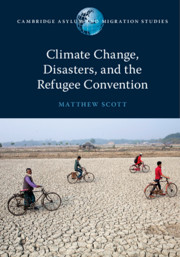Book contents
- Climate Change, Disasters, and the Refugee Convention
- Cambridge Asylum and Migration Studies
- Climate Change, Disasters, and the Refugee Convention
- Copyright page
- Contents
- Figures
- Series Editor’s Preface
- Acknowledgements
- Note on the Text
- Table of Cases
- Table of Treaties and Other International and Regional Instruments
- Abbreviations
- 1 Introduction
- 2 Two Disaster Paradigms
- 3 Jurisprudence on the Determination of Refugee Status in the Context of ‘Natural’ Disasters and Climate Change
- 4 Interpreting the Refugee Definition
- 5 The Temporal Scope of Being Persecuted
- 6 The Personal Scope of Being Persecuted: The Function of the Non-discrimination Norm within the Refugee Definition
- 7 Refugee Status Determination in the Context of ‘Natural’ Disasters and Climate Change
- Appendix: Taxonomy
- Bibliography
- Index
3 - Jurisprudence on the Determination of Refugee Status in the Context of ‘Natural’ Disasters and Climate Change
Published online by Cambridge University Press: 18 January 2020
- Climate Change, Disasters, and the Refugee Convention
- Cambridge Asylum and Migration Studies
- Climate Change, Disasters, and the Refugee Convention
- Copyright page
- Contents
- Figures
- Series Editor’s Preface
- Acknowledgements
- Note on the Text
- Table of Cases
- Table of Treaties and Other International and Regional Instruments
- Abbreviations
- 1 Introduction
- 2 Two Disaster Paradigms
- 3 Jurisprudence on the Determination of Refugee Status in the Context of ‘Natural’ Disasters and Climate Change
- 4 Interpreting the Refugee Definition
- 5 The Temporal Scope of Being Persecuted
- 6 The Personal Scope of Being Persecuted: The Function of the Non-discrimination Norm within the Refugee Definition
- 7 Refugee Status Determination in the Context of ‘Natural’ Disasters and Climate Change
- Appendix: Taxonomy
- Bibliography
- Index
Summary
This chapter presents the results of a review of jurisprudence relating to refugee status determination in the context of disasters and climate change. A taxonomy of the kinds of circumstances in which a person may establish a well-founded fear of being persecuted for a Convention reason is constructed and relevant cases described. The chapter identifies a number of cases where individuals were recognised as being eligible for refugee status in the context of disasters and climate change. It notes that cases in which disasters and climate change form the backdrop to familiar examples of intentional infliction of harm for a Convention reason were far more successful than cases reflecting other failures of state protection. Significant attention is paid to jurisprudence from the New Zealand Immigration and Protection Tribunal owing to the clear and principled human rights-based methodology it articulates. However, limitations in the human rights-based approach are identified, and these limitations are examined closely in subsequent chapters.
Keywords
- Type
- Chapter
- Information
- Climate Change, Disasters, and the Refugee Convention , pp. 32 - 88Publisher: Cambridge University PressPrint publication year: 2020



